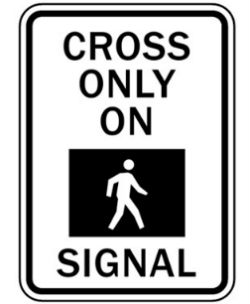I started thinking about ordination processes the other day when I got out of my car. I noticed a colleague of mine had arrived and parked maybe a minute earlier -- but I beat him into the building easily. He took the sidewalks, and then waited for the “walk” light at the intersection, while I made a direct beeline for the door, walking on grass, running to evade an oncoming car, ignoring rules I didn’t see anybody around to enforce.
earlier -- but I beat him into the building easily. He took the sidewalks, and then waited for the “walk” light at the intersection, while I made a direct beeline for the door, walking on grass, running to evade an oncoming car, ignoring rules I didn’t see anybody around to enforce.
Let me dare to suggest that in today’s imperiled church we need candidates for ministry who don’t necessarily wait politely at the crosswalk, and don’t mind cutting through the yard. But I suspect that, because the church feels imperiled, our tendency is to stand out there and make sure all rules are obeyed -- which is why our church will die a long, slow, boring death.
I respect those charged with interviewing and screening whom we let into ministry. God knows we’ve let some in we shouldn’t have. But I am weary and feel a bit dirty when, every year, I am asked by would-be clergy how to get through the committees and boards, and I tell them to dumb things down; don’t get creative now; march in time; look safe.
If our process pressures the brilliant and creative to keep it simple and not step out of the box, how will the church do what it needs to do -- namely, step out of the box and get creative?
A few years ago, a candidate asked me to read his papers before submission. He took the point by point queries about theology, sacraments and ministry, and wrote publishable, witty, riveting short stories that more than fully answered every question and exhibited a heady wisdom for engaging theology and the real world. The board, sadly and predictably, sent them back to him, saying he didn’t follow the instructions.
Every year, some smart, wickedly inventive person I know gets snubbed by a board or committee on some little technicality, or because the candidate just seemed too uncooperative or scary. These candidates get hurt and feel jaded about the church they love and have offered their lives to serve. Meanwhile, the safe, lifelong insiders -- those most likely to perpetuate where we’ve been -- skate through smoothly. Make no mistake, they too can help us, these folks who wait for the crosswalk light; they just aren’t the ones we need the most to break out of our current ecclesiastical blahs.
As admitted already, I’ve always had a heart for cutting across the grass. My second year in ministry we had to submit forms, with big letters at the top saying, “Record of Performance.” There was a long list of metrics: numbers of new members, worship attendance, money raised and so on. I had good metrics, but my cheekier self revolted. I scrawled across the form, in big red letters, “I refuse to accept numbers as a meaningful record of my performance.” My district superintendent lovingly urged me: “Just fill out the form!” But I stuck with what I had.
Numbers do matter. Ministerial candidates should know how to be institutional people. But aren’t we also desperate for rule-benders, people who can’t bear the status quo, who get that it might be holiness or passion or some immeasurable but palpable reality that will drive the church into God’s good future, who see the old questions and blow your mind with creative reworkings of the answers -- people more creative than any of us reading this have ever dared to be?
James Howell is senior pastor of Myers Park United Methodist Church in Charlotte, North Carolina.







